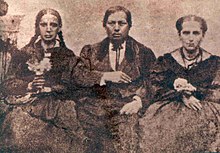Benito Juarez
Benito Juárez García (born March 21, 1806 in the mountain village of Guelatao near Ixtlán de Juárez , † July 18, 1872 in Mexico City ) was a Mexican statesman and President of Mexico from 1858 to 1872. He is considered one of the greatest reformers in Mexico.
Life
Benito Juárez was born in the town of Guelatao in the state of Oaxaca as the son of the Zapotec farmers Brígida García and Marcelino Juárez. After he was orphaned at the age of three , he was raised by priests. He did not speak Spanish until he was 15 . After his studies and a brief activity as a lawyer , he turned to politics, he became part of the Liberals .
After Mexico's defeat in the war against the United States in 1848, he belonged to the new generation of liberals that he eventually became leader of. In 1854 he was involved in the Ayutla plan that demanded the deposition of General Antonio López de Santa Anna , who had been defeated in the war , which he resigned the following year. Juárez returned to Mexico from exile and participated in the program that went down in history as La Reforma . Juárez became a member of the provisional government under General Juan Álvarez . As Minister of Justice, he passed reform laws on the separation of church and state , civil marriage , freedom of religion and the abolition of monasteries .
He developed into an advocate of the abolition of ejido, known as agricultural reform . After the resignation of President Ignacio Comonfort , he took over as Chief Justice in 1858 in accordance with the constitution of 1857 . The civil war against the conservatives , triggered not least by this in 1858, was won in 1861.
As the country was financially drained, Juárez wanted to stop repaying foreign debts for two years. France was also one of the creditor countries . That gave Napoleon III. the pretext to intervene militarily in Mexico. In 1864 he installed a puppet government with the Archduke of the Imperial House of Austria Maximilian von Habsburg as Emperor of Mexico.
Great Britain and Spain initially participated, but soon withdrew. The French intervention started at the end of 1861. On January 25, 1862, the initially militarily defeated Juárez passed a law that threatened all French helpers with the death penalty .
In 1865, after the end of the Civil War , the US insisted on its Monroe Doctrine again , and Napoleon III. In 1866 he was forced to withdraw his troops from Mexico. After defeating the remaining troops of the emperor Juárez supervised personally 1867 in Santiago de Querétaro the standing legal shooting emperor Maximilian I.
Juárez continued his reform work until his death. He died of a heart attack in his official residence in 1872 .
effect
Numerous streets and statues are named after Benito Juárez. His saying is also popular: "El respeto al derecho ajeno es la paz" ("Respect for the rights of others means peace").
Places named after Juárez
- Ciudad Juárez has been named after him since 1888 .
- The airport Benito Juárez International Airport in Mexico City was named after him.
- The Delegación Benito Juárez , one of 16 districts of Mexico City, is also named after him.
- The Paseo de la Reforma , Mexico City's boulevard, was named after its reform laws.
Trivia
- Benito Juárez was very short at 135 cm.
- License plates in the state of Oaxaca show a portrait of Juarez.
- His great-grandson Carlos Obregón Santacilia was an important Mexican architect.
- Benito Mussolini was named after Benito Juárez.
- The 20 peso banknote from Mexico adorns his face.
Juárez in literature and film
- Karl May : Waldröschen III. Münchmeyer Verlag, Dresden 1882–1884. (Edited by Karl May Verlag and T .: Benito Juarez. Bamberg. (Collected Works; 53)).
- Friedrich Gerstäcker : In Mexico . A novel with historical references. Approx. 1872–1875 in the collected writings in Hermann Costenobla, Jena.
- Franz Werfel : Juarez and Maximilian. Dramatic history in 3 phases and 13 images. Paul Zsolnay Verlag, Vienna 1924.
- Juarez , film by William Dieterle (1939), with Paul Muni as Benito Juarez.
- Vera Cruz , film with Gary Cooper and Burt Lancaster (1954).
- The Aztec Treasure , film by Robert Siodmak (1964), with Fausto Tozzi as Benito Juarez.
- Prairie Hunters in Mexico , Part 1: Benito Juarez . TV film by Hans Knötzsch (1988).
- John Retcliffe : Puebla or The French in Mexico . 3 volumes. 1865–1867 ( Die Adventurer der Sonora , Zu den Quellen des Buenaventura , Goldfieber . Retcliffe-Verlag, Radebeul 1930, edited by Barthel-Winkler).
- Maximilian von Mexico , TV-FRG 1970, with Dieter Borsche as Juarez.
literature
- G. Pinto: The Lincoln of Mexico . In: The Gazebo . Issue 11, 1867, pp. 174–176 ( full text [ Wikisource ]).
- Once again the "Lincoln Mexicos" . In: The Gazebo . Issue 18, 1867, pp. 284, 288 ( full text [ Wikisource ]).
Web links
- Literature about Benito Juárez in the catalog of the Ibero-American Institute in Berlin
| predecessor | Office | successor |
|---|---|---|
| Ignacio Comonfort |
President of Mexico 1858–1863 |
Juan Nepomuceno Almonte |
| Emperor Maximilian I. |
President of Mexico 1867–1872 |
Sebastian Lerdo de Tejada |
| personal data | |
|---|---|
| SURNAME | Juarez, Benito |
| ALTERNATIVE NAMES | Juárez García, Benito |
| BRIEF DESCRIPTION | President of Mexico |
| DATE OF BIRTH | March 21, 1806 |
| PLACE OF BIRTH | Guelatao |
| DATE OF DEATH | July 18, 1872 |
| Place of death | Mexico city |




